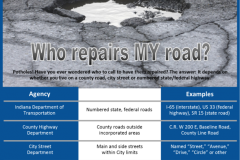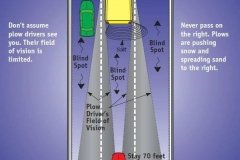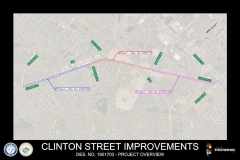
News release from INDOT:
INDOT Preparing for Winter Storm Late Saturday through Sunday
Low Temps May Cause Refreezing, High Winds May Blow Snow
(January 9, 2016) – National Weather Service offices in Chicago and Fort Wayne have declared winter storm warnings for four Indiana border counties and winter weather advisories for another 12 northern Indiana counties. Three to 6 inches of accumulating snow is forecast for northwest Indiana through Sunday with 1 to 3 inches forecast northwest of a line running through Terre Haute, Indianapolis and Fort Wayne. The rest of the state may see a dusting to 1 inch of snow.
Indiana Department of Transportation maintenance supervisors are closely monitoring evolving local forecasts. Maintenance garages in Indiana have been servicing yellow plow trucks in preparation for 24-7 operation.
Because most of the storm will lead off with rain, INDOT’s yellow plow trucks will be deployed before pavement temperatures fall and snow and ice begin to accumulate on Indiana’s interstates, U.S. highways and state routes. Trained employees are on call to staff plow trucks around the clock with alternating shifts of 12 hours or more. As there are changes in forecasted and observed road conditions, INDOT’s maintenance supervisors will adjust their call-out of manpower, trucks and materials and shift resources as appropriate.
Conditions worst during storm
Each plow route takes 2-3 hours to complete with salt assisting in melting between passes. Because this storm is limited to the weekend, INDOT urges drivers to reschedule optional trips during and shortly after winter precipitation as that’s when road conditions will be the worst.
Drivers may see plow trucks working in tandem on multi-lane state highways. Traffic should not attempt to pass plow trucks if all lanes are blocked, but stay a safe distance and speed behind. Road conditions are always better behind a plow at work than in front.
Low temps, high winds follow storm
INDOT plow crews will work to make state highways as clear and dry as quickly as possible. High winds may cause blowing or drifting snow and reduced visibility in northern Indiana. Following the storm, temperatures are predicted to fall statewide, which may cause refreezing of any remaining meltwater on the roads.
Ice can be the most difficult road conditions for drivers to navigate and plow crews to treat because four-wheel-drive vehicles and large trucks are no match if all tires are on ice. “Black ice” or “slick spots” can also be hard for drivers to distinguish from wet pavement.
Granular salt helps to add traction while lowering the temperature at which the ice melts.
Know before you go
If you must venture out, there are several state resources that drivers can access to “know before you go”:
- Counties post travel advisories as new information is available to in.gov/dhs/ or the Indiana Travel Advisory app for iPhone or Android.
- INDOT maintenance staff report color-coded winter driving conditions on INDOT’s TrafficWise map at https://indot.carsprogram.org. Road conditions are defined as: (1) Gray: Good, the road is clear (2) Blue: Fair, speed is reduced due to isolated patches of snow and ice, and (3) Violet: Difficult or hazardous, speed is reduced due to snow and/or ice covered pavement.
- Find your regional INDOT district on Facebook and Twitter at https://in.gov/indot/3074.htm.
Driver tips
There are several steps that drivers can take to minimize the risk of losing control on snow-covered or icy roads:
- Consult local weather forecasts to determine the latest timing and location of the storm.
- Choose direct routes instead of longer routes using higher-speed highways.
- Increase following distance and turn off cruise control.
- Take your foot off the gas and slow down gradually, especially on high-speed highways.
- No one should be traveling at interstate speeds during winter weather. Law enforcement will be writing citations for drivers going faster than conditions merit and putting others in harm’s way.
- Apply anti-lock brakes firmly. Pump brakes that are not anti-lock. Do not overcorrect with steering.
- Don’t crowd the plow: Stay a safe distance and speed behind a plow at work as road conditions are always better behind one than in front.








